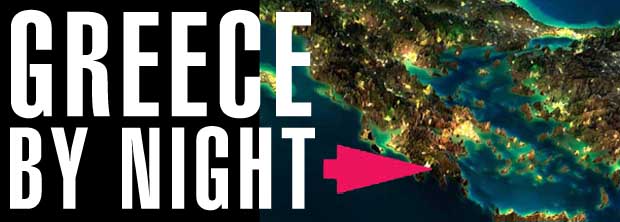NEWS ARCHIVE - JULY 2011
For current news items, go to the home page
July 29, 2011
Turkey military leadership resigns
This is not exactly good news, Turkish military leadership resigns en masse (their words) or 'all retired' (official explanation from the Prime Minister Recep Tayyip Erdogan government). Either way the circumstances seem to signal further decay within the Turk military as a secular institution, and that Erdogan's apparent goal of Islamification of all aspects of Turkish civil life is leaping forward.
Reuters has a concise over view of the issue online here.
WSJ: EFSF may not be ready in time for September €8.5 billion loan
The European Financial Stability Facility is supposed to raise its lending monies through the financial markets, but with much of Europe on vacation through August and still in negotiations in several countries for participation in the program, the mid-September deadline date is starting to look shakey. With ratification of the program incomplete across the euro zone, EU leadership is already discussing how to meet the September payment to Greece. An ironic aspect is that Italy or Spanish banks may be putting forward loans to Greece as part of a plan in the absence of the EFSF, a situation simultaneous with those countries own debt dilemmas mounting.
Read the Wall Street Journal story online.

Beach at Palaio Faliro in Athens
July 25, 2011
Moody's Investors Service lowers Greece rating three notches to Ca
Greek government long-term currency debt was downgraded by Moody's to Ca, their second to last rating. Basing the move on a reflection of the losses to be experienced by private creditors from the coming debt-exchange as part of the eurozone package of funds and debt-rollovers. In the exchange, banks are to write down Greek bonds by 21%, and the process will impact private holders of Greek debt, constituting default by standards used by Moody's.
The Standard & Poor's rating on Greece was recently moved to CCC (June 13), which is their lowest rating.
The Fitch Agency downgraded Greece to one notch above default on July 24.
After the exchange has completed, Greek ratings are expected to rise.
July 24, 2011
Greek finance minister Evangelos Venizelos urges return of Greek deposits
Venizelos (not related to the famous Eleftherios Venizelos) is trying to encourage Greeks who have moved their deposits out of the country to return them to the cash-starved Greek banking system. With the latest eurozone backed program of July 21, Greek bank liquidity is guaranteed through the European Central Bank. Beyond that, a recapitalization fund of €20 billion set aside for Greek banks is expected from the July 21 eurozone agreement.
"Greece is better off inside Europe than outside it" - Nation
The pros and cons for the Greek condition vis-avis Europe/EU - READ MORE
July 23, 2011
€109 billion euro package for Greece
July 21, 2011
EU leaders still talking: spectators expecting some form of default
UPDATE: In a draft statement, the EU has agreed to extend the maturities of loans to Greece and to reduce their interest rate. Also a call has been made for the creation of an economic stimulus program for Greece.
Headline at CNBC: "New Greek Bailout Can't Rule Out Default: Juncker: "
"The draft statement allows for an expanded role for the European Financial Stability Facility, the euro zone's rescue fund, according to the Dow Jones source. This would include offering more flexible lines of credit as well as possibly being involved in the recapitalization of banks."
Early Thursday: Indecision thus far
The big three credit-reporting agencies are watching to see what will come out of the Thursday EU leadership meeting, but most people are expecting the German plan of involving private investors to be inside the final agreements. If so, this will happen despite both French President Nickolas Sarkozy and ECB President Jean-Claude Trichet originally opposing such a plan as it certainly will trigger temporary default and might set a precedent for the other countries in the queue for economic default (Spain, Portugal, Ireland and Italy).
July 20, 2011
Taxes, rollovers, 'selective default,' more money: EU summit
July 19, 2011
Let the Greeks have what they deserve/want: Communism
In a blog post at Forbes surely meant to offend (and draw site traffic) Bill Frezza admonishes the Greeks for laziness (and mentions that Greece got into the EU at the expense of the 'hard-working Turks'). Read the moved item article here.
July 18, 2011
Germany argues for private investor participation; ECB against
German Chancellor Angela Merkel's government is set to attend the Thursday (July 21) emergency meeting of eurozone leadership, but is threatening to not show up if concrete plans have not been formulated for the summit meeting. Read this moved article item here.
"Moment of destiny approaches for the Euro" - Kathimerini
Article about euro moved here.
Globe and Mail "The Two United States"
Drawing comparisons between the ongoing Greek crisis and the problematic numbers in the United States - item moved here
July 14, 2011
Fitch downgrades Greece to one step above defaultIndecision in European leadership aggravating crisis: Papandreou
With the unexpected downgrade by Fitch, Papandreou has begun to say the situation will turn for the worse if the EU leadership doesn't get a second bailout plan organized.
Papandreou comments from July 11 (via Bloomberg):
"I am now convinced, after 14 months, that no matter what Greece does -- and we have proven ready to live up to our responsibilities -- if Europe does not make the right, collective forceful decisions now, we risk new and possibly global market calamities due to a contagion of doubt,” Papandreou said. “Strong and visionary European leadership is needed.”
Bonds of debt-strapped countries plunged, the euro sank and stocks dropped amid concern that European governments are powerless to prevent the financial distress spreading from Greece. "
"Systematic Crisis"
Olli Rehn, speaking on the debt-problem plaguing Europe:
"The crisis is now systemic," said Olli Rehn, European Commissioner for Economic and Financial Affairs.
(Rehn made a similar statement in December 2010, that the problem was becoming systematic.)
German Finance Minister Wolfgang Schäuble has said they must now move quickly to build confidence in the eurozone. Schauble had been one of the voices pushing for private-investor involvement for the Greek bailout, but with the three credit-rating agencies repeatedly saying this qualifies as default, Schauble has said (July 14) that he "must yield to reality." (See this Der Spiegle article for sourcing.)
Greek Banks: If default happens, the European Central Bank then stops providing liquidity to Greek banks, many who have no reserves to depend upon for providing depositor funds, therefore when a customer in Athens withdraws funds from a Greek bank, that person is (often) receiving ECB money. With default, the Greek banking system will seize up.
From the Der Spiegel news item:
"Athens, meanwhile, is anxious for a rapid decision. In an interview with the Financial Times Deutschland published on Thursday, Greek Prime Minister Giorgios Papandreou said that "if we don't have a decision soon on a second program for Greece ... the program could collapse of its own accord." He added that "the current mood is not helping us pull ourselves out of the crisis."
Spanish Finance Minister Elena Salgado also urged a quick decision on the Greek aid package. Speaking to the Süddeutsche Zeitung, she said "we are no longer talking about the crisis of a certain country, but about a systemic crisis."
Italy
With the Fitch downgrade, Greece moves back onto the hotplate of debt worries in Europe, replacing Italy which had temporarily become the main focus because of its debt-to-GDP ratio of 119% and an increase of interest on Italian bonds (Italy had a successful bond sale of 5-year notes on July 14). Another Italian problem is a 2.5% growth rate measurable from the year 2000, which doesn't even track with the population growth: but still, this is better than the -3.8% contraction for 2011 Greece is dealing with. Another Greece/italy comparison, though, is the black market. Only Greece is ahead of Italy in how much business is performed "off the books" (the Wikipedia article on the Italian economy says this hidden portion of Italian GDP may be 30%).
Like Greece, italy is trying to implement an austerity plan, but in this case it is mostly a home-grown program to cut costs and to head off a sudden surge in cost of debt. With Greece as an example, Italy can see what will happen next. Likewise, the next fear is that Italians will begin a currency flight of bank deposits into other countries (as has happened in Greece)
July 9, 2011
IMF approves €3.2 billion tranche paymentJuly 7, 2011
Privatization Board to be presented Monday
Greek Finance Minister Evangelos Venizeloshas been busy meeting with Wolfgang Schauble (Federal Minister of Finance in Merkel's second cabinet), and Jean-Claude Trichet (European Central Bank president) this week, working out the details for the planned announcement on Monday (July 11) for the names of the people who will occupy the board of director seats for the coming Privatization Agency in Greece. Though privatization has always been a part of the austerity schemes Greece has agreed to since the IMF/Eurozone/ECB bailouts began in 2009, actual sales have not been occurring. Now both the IMF and and the EU has said there won't be additional money until public sector sell-offs have begun.
With a goal of €5 billion in sales by the end of 2011, and upwards of €50 billion in sell-offs by the end of the scheduled austerity plan in 2015, the Greek privatization Agency will have its hands full. Composed of five board members with two (non-voting) observers appointed by the eurozone, they will serve three-year terms.
Inflation stays at 3.3%: unemployment at 15.9%
How Greek disaster is seen as (political) victory
In eKathimerini, Nikos Konstandaras criticizes the built-in divisions of Greek public life ("The Rage of Achilles, Over and over") that makes reaching unity so difficult:
"...It is no coincidence that “The Iliad,” the mold from that which we now call Hellenism was shaped, focuses on the personal quarrel between Agamemnon and Achilles which jeopardizes their 10-year expedition against Troy. Our politicians in Parliament, the masked stone-throwers and the heavily armored riot police repeatedly relive this ritual, each seeing himself as a hero."
Konstandaras' piece describes a political system in which the warring twin parties each "own the truth" and cannot reach consensus because it goes against the nature of their aims, which is the defeat of the other side, a task completely obscuring the responsibility to manage Greece in an effective way: in fact, such a sense of direction seems to demand collapse and disaster so that one political party can win over the other.
July 3, 2011
Standard & Poor's says 'French Model" qualifies as default
Standard and Poor's has indicated that it would view the "French Model," (sometimes referred to as 'Plan B' in case of imminent default) which is a scheme by which private creditors will reinvest 70 percent of the receipts from maturing Greek bonds: 50 percent into new Greek bonds with 30-year maturities and the other 20 percent into bonds with no running interest payments. Second version of this plan entails the rollover of 90% of the bond maturity money into 5-year Greek bonds. Both versions are considered actual defaults by Standard and Poor's as each features financial loss on the part of the bond holders. The Monday announcement from Standard and Poor's effected a depreciation of the euro versus the U.S. dollar.
Standard and Poor's also questioned the ability of Greece to completely implement the complete austerity program that was agreed to last week. With many banks in europe ( for example, the ECB) already saying they will not accept the "renewal bonds" that would come from the 'French Model,' the pressure toward bankruptcy (and sticking to the official IMF/eurozone/ECB plan) seems to have been increased, particularly in the face that negotiations over a second bailout program is to begin soon between Greece and the eurozone/IMF/ECB. Probably the one positive aspect in this direction is that some 400 banks (according to the German Financial Times) are volunteering financial assistance to the Greeks.
Der Spiegel carried this item on the Standard and Poor's announcement:
"Allianz, Europe's biggest insurer, said it would contribute €300 million to the new Greek aid package. Allianz CEO Michael Diekmann said there was no alternative to supporting Greece. A Greek insolvency would have a bigger impact than the collapse of Lehman Brothers, he warned."
Led by the Germans, the eurozone is holding talks with the world's credit rating agencies to negotiate ways to extend or 'rollover' Greek bonds without triggering default status.
Berlin wants privatizations carried out before negotiating new bailout plan
German Finance Minister Wolfgang Schaeuble wants Greece to begin carrying out the agreed upon privatization agreements from the existing austerity plans before negotiating new bailout terms this autumn. Though Greece has agreed to privatization already in the past (see this June 2010 item for an early list, or this June 2011 list for details of the 'Troika' plan), very little has been carried out, and foot dragging is expected to continue unless pressure is brought to bear.
Three issues confront privatizations proponents:
- A touchy issue with Greeks is the prospect of public companies being sold into the controls of non-Greek companies. Continued strikes and demonstrations are sure to result.
- The agreed upon schedule for privatization seems to indicate a rate of one asset sold every ten days, which leads to the third problem:
- Rapid sell-offs will erode state company values, as scheduling will trump actual value assessments, buyers able to negotiate with a significant advantages over the seller who must operate with significant IMF/EU/ECB pressure at their shoulder along with the speed of the schedule.
Greece, the Treuhand experience in Germany & Foreign Investment
The "Treuhand privatization" experience in the integration of East Germany with West Germany has been held up as a model for Greece and the IMF/ECB/EU to follow for privatizing state companies.
More Greece and the Treuhand Experience



Greece's Golden Visa program
